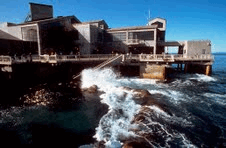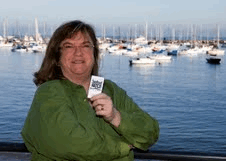Good Fish, Bad Fish
Air Date: Week of January 22, 2010

Seafood Watch's headquarters. (Courtesy of the Monterey Bay Aquarium)
A new study by The Environmental Health Perspectives journal points out the dangers of persistent organic pollutants in farmed salmon. Yet the Monterey Bay Aquarium’s Seafood Watch Program just approved one kind of salmon farming. Host Jeff Young talks with Shelia Bowman of the Monterey Bay Aquarium about how one company is trying to clean up their tank.
Transcript
YOUNG: For years, environment and health advocates have urged consumers to avoid farm-raised salmon. Two recent developments might muddy the waters around salmon aquaculture: a new study links the contaminants in those fish to insulin resistance – that’s bad. But the influential Seafood Watch gave its first-ever seal of approval to one kind of salmon farming, the practices used by AquaSeed Corporation in Rochester, Washington – that’s good.
Confused? Well, we were too, so we called up Sheila Bowman to sort things out. She’s the senior outreach manager for Seafood Watch at the Monterey Bay Aquarium. Welcome to Living on Earth!
BOWMAN: Thank you, Jeff; it’s great to be here.
YOUNG: Well let’s start with this study on contaminants in farmed salmon. This was published in Environmental Health Perspectives, there’s some link to insulin resistance, which may be a precursor to a type of diabetes. What did we learn here?
BOWMAN: Well I think what that study highlights is within in the environment there’s these persistent, organic pollutants. These are things like the DDT’s and the pesticides that we’ve been using. They’re persistent, they’re not breaking down, they’re not going away, they’re finding their way into first the environment and now into our food system. And these salmon are just kind of one of the places where these end up, and of course we’re interested in and impacted when it’s something we eat.
YOUNG: Why is this of special concern for farmed salmon?
BOWMAN: Well, the thing about farmed salmon is it’s a system where you are raising carnivorous fish in fairly intensive situations, usually pretty highly packed farms with fish. And these farmed fish are really being forced to eat pellets that you find where they’ve taken lots of wild fish, put them into pellets, concentrated any toxins that might be there, and put those out to the fish.

Seafood Watch's headquarters. (Courtesy of the Monterey Bay Aquarium)
YOUNG: And other concerns about farmed salmon, I guess, go beyond the effect on the consumer and health to the effect on the area where the salmon farming takes place.
BOWMAN: Well, exactly, and I think our concern beyond the food quality that comes out of those farms is what are these farms doing to the environment. So, are they situated in a place where they’re having negative impact on the oceans and the fish that live there?
A lot of fish in a small farm make a lot of poop. And if they get a disease then they’re going to get some chemical treatments and antibiotics, and of course farmed salmon have a lot of lice, so there’s the parasite treatment. So there’s a lot farming that goes into the farming of these fish. And when you put their farms just in an open bay where those products can escape into the environment, you know you’ve really got a pretty unpleasant kind of thing to think about with all of that flowing out into the wild.
YOUNG: So lots of problems with aquaculture and salmon. However, your group recently looked at one kind of salmon and gave it the thumbs up. What’s different about that approach to raising salmon?
BOWMAN: Well, we did, and we were pretty pleased to find somebody within the salmon farming industry who was interested in doing things differently.

Sheila Bowman of Seafood Watch. (Courtesy of the Monterey Bay Aquarium)
So, rather than positioning the farm out in a bay where all of those products just flow out into the wild, we started seeing some of these farmers moving these farms onshore, putting them into tanks where they’re containing the fish, containing the fish waste; all of those detrimental impacts are now being managed by the farm, so it’s not creating these kind of areas of impact within the wild environment.
YOUNG: And how has that type of salmon farming addressed the health issues and what the salmon are fed?
BOWMAN: These particular salmon are being fed a more mixed diet, so what they’re getting is not just high levels of wild marine fish turned into pellets; they’re getting chicken, they’re getting poultry, which means that they’re not going to get food with a lot of pollutants in it that they’re going to then kind of sequester and carry on in their bodies.
YOUNG: So, fish eating chicken; in this case is not necessarily a bad thing?
BOWMAN: Well, you know fish need protein, if you’re going to raise a carnivorous species, so the challenge is: do you take a lot of wild fish and turn them into pellets to feed your carnivorous fish? Or do you find your protein somewhere else?
YOUNG: So, one farm seems to be taking some positive steps and you’ve decided to give them the thumbs up, does that mean that I, the consumer, should be looking for that source of farmed salmon?
BOWMAN: It’s not quite there yet. I mean we’re excited about the future of this, but consumers are going to have to wait a little while and until then the farmed salmon they see in the market, they pretty much can assume is that traditional farmed salmon that they do want to avoid.
YOUNG: Where do you see aquaculture heading here in the coming years?
BOWMAN: This year we will as a country for the first time be consuming more farmed fish than wild fish. We’ve turned that corner. So how fish are farmed is going to be important to every one of us, not only for the environment that’s impacted but how the fish are raised and what kind of quality of fish is coming out of it.
So, we do see a shift in a movement and a lot of it’s because consumers have become aware and they want to throw their support behind businesses that are doing the right thing.
YOUNG: And your bottom line here has not really shifted, your advice is still pretty straightforward.
BOWMAN: Our advice is still for 99 percent of us out there to avoid farmed salmon. This species that’s coming out in Washington State is going to be very regional in its distribution and it’s not something that’s going to be in the marketplace for at least a few years.
YOUNG: Sheila Bowman with the Monterey Bay Aquarium’s Seafood Watch. Thanks very much.
BOWMAN: Thank you, Jeff.
YOUNG: Check the Seafood Watch list and more at our website l-o-e dot org.
Links
To learn more about the Monterey Bay Aquarium’s Seafood Watch program, click here.
Click here to view the aquarium’s recommendations for fish that are the most sustainable to eat.
Living on Earth wants to hear from you!
Living on Earth
62 Calef Highway, Suite 212
Lee, NH 03861
Telephone: 617-287-4121
E-mail: comments@loe.org
Newsletter [Click here]
Donate to Living on Earth!
Living on Earth is an independent media program and relies entirely on contributions from listeners and institutions supporting public service. Please donate now to preserve an independent environmental voice.
NewsletterLiving on Earth offers a weekly delivery of the show's rundown to your mailbox. Sign up for our newsletter today!
 Sailors For The Sea: Be the change you want to sea.
Sailors For The Sea: Be the change you want to sea.
 The Grantham Foundation for the Protection of the Environment: Committed to protecting and improving the health of the global environment.
The Grantham Foundation for the Protection of the Environment: Committed to protecting and improving the health of the global environment.
 Contribute to Living on Earth and receive, as our gift to you, an archival print of one of Mark Seth Lender's extraordinary wildlife photographs. Follow the link to see Mark's current collection of photographs.
Contribute to Living on Earth and receive, as our gift to you, an archival print of one of Mark Seth Lender's extraordinary wildlife photographs. Follow the link to see Mark's current collection of photographs.
 Buy a signed copy of Mark Seth Lender's book Smeagull the Seagull & support Living on Earth
Buy a signed copy of Mark Seth Lender's book Smeagull the Seagull & support Living on Earth

